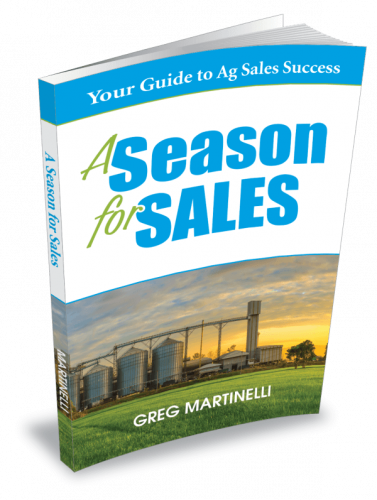Grow your super strengths of Team Selling and
Customer Focused Skills to become a Trusted Advisor
Today, we cover part three in our three-part series.
Ten, twenty or thirty years ago, our job as a salesperson was to go to the farm and inform customers about our products. We were the primary source of information. Not so much in today’s agribusiness environment. Customers can learn as much or more about our products before we ever get to the farm or their office. The Information Age or maybe more appropriately, the Internet Age has changed our role. We now need to come to the market with a collaborative set of skills as a Trusted Advisor.
Why? First, customers want to verify the online information and educate themselves on their local buying process. In gathering this background information, our customer most likely has researched your products on line and has some idea of what they want. Granted, their idea might be completely wrong, but they do have some knowledge. One equipment salesperson selling compact tractors said, “Most customers come in with the specs on a compact that they want. And most of the time they are way under or over speced for what they intend to do with it.”
This is a great example of our new role in selling to producers. Customers are looking for us to help them navigate their buying process. This goes beyond product knowledge.
How? how do we grow our super strengths of Team Selling and Customer Focused Selling Skills?
Review:
There are hundreds, maybe thousands of sales training companies, sales coaches and sales team development companies to choose from. Most are probably good and probably teach something that works. The problem is that they don’t get specific to agribusiness. They don’t get specific to your geography, your market place. They probably don’t get specific to your team. One VP of sales asked me, “My sales team has experience levels from one month to 30 years. Do you have a way to engage and develop that diverse of a group?”
- Focus area #1, you can read at: Bring all your resources to the Sale or you can listen to the Podcast at: Ag Sales Podcasts Please go back and review how to bring more resources to the sale than your competition. Make your support team part of your strength.
- Focus area #2 , you can read it at: Shift your Sales Approach or you can listen to it at: Ag Sales Podcast. Please go back and review how to shift your sales approach to the customer’s buying process versus your selling process. Become a Trusted Advisor to your customers and your industry.
What? What does customize development look like?
I found that using generic products like a car or a boat as an example product to sell in a training workshop quickly disengages an agribusiness sales team. The base concepts were the same, but the attendees just don’t feel the relevance to what they do when selling to producers.
My next approach was to use scenarios where they sold those generic products to farmers. This was a little better but not as good as it could be. I wanted to connect the training even more to their real-world experiences.
Finally, I got it. They needed scenarios for their products, in their market up against their competitors. Selling farm tractors in the Midwest to row crop producers is very different than selling agronomy products to Ag retailers in the West Coast specialty crop market. Selling Ag lending services in South Dakota is very different than irrigation products through distributors in Texas. This approach finally got the engagement going in the workshops, which leads to learning, retention and implementation afterwards.
It takes extra time and effort for every company I work with, but the results make it worth the effort. It involves:
- Phone/Zoom discussions with salespeople, and key people in the company. This includes managers, customer service and other departments.
- Self-assessments by all attendees.
- One on one discussions between the attendee and their manager about those self-evaluations.
- All that information is gathered and then reviewed with the VP of Sales or Sales Manager to determine the best agenda and time needed.
- This all leads to a customized program for this company.
- It’s not over there. After the training, I found several key questions to ask as feedback. These questions give insight into how well they understood the training. More importantly, it shows how successful they will be at implementing the action items from the training.
- Lastly, they walk out with a customized list on how they plan to implement the training. We come back and review that list in a follow-on webinar session. This provides one more component to getting accountability to take advantage of the training.
It seems like a lot of work on both my part and the attendees. It’s not much more work for the attendee, but honestly, it is on my end. I could very easily go in and present for a half day or full day on important selling skills. That’s not difficult and it might even hit home for some attendees. But I’m not aiming for some attendees. I want to engage them all. Or at least most. There’s always that one that doesn’t want to learn.
5 Components of Customized and Combined Development
- The real organization chart with your customer on it. This helps everyone understand their role.
- Pre-work
- All team training workshop
- Customized Training, specific to your industry, your market, your company and your team.
- Routine check ups
4 Benefits from a combined and customized development program
- A more self-confident sales team
- More engaged employees in all departments
- More customer focus which leads to:
- Less customer turnover
- More referrals
- More share of the customer’s spending on your product line (share of wallet)
- More impact in your customers business and livelihood
- More rewarding careers
- Profitability, Adaptability, Survive and Thrive in a volatile, highly competitive market.
Related articles:
To help non-sales team members understand why they are at a sales meeting.
To tear down some of the silos we have in our industry.
To understand that it’s not business as usual for us nor for our customers.



